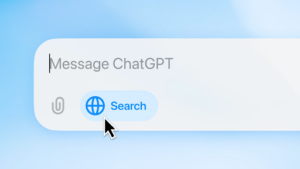ChatGPT search: a potential disruptor to search behavior

Ever since ChatGPT launched publicly in 2022, the AI platform has entered the zeitgeist of marketing thought and consideration. With over 180.5 million users, this novel form of information gathering has evolved the way many users learn and make decisions. Now, ChatGPT is making a new attempt at capturing market share from Google search with the launch of ChatGPT search.
What is ChatGPT search?
ChatGPT search integrates a previous prototype, SearchGPT, into ChatGPT. This integration allows users to get current information through the ChatGPT interface, blending the benefits of a conversational experience with timely information, along with source links that appear within the interface.
Here are answers to a few common ChatGPT search questions:
- When did this happen? This was announced on October 31, 2024
- How does ChatGPT search gain access to current information? OpenAI has partnered with news and data providers to allow users to find up-to-date information
- How do users access this search function? The new search function is automatically presented to users based on what is typed into ChatGPT — or users can manually choose to search by clicking the icon
- When will this feature be available to users? The search function will be available immediately for ChatGPT “Plus” and “Team” users and SearchGPT waitlist users, followed by “Enterprise” and “Edu” users, and lastly rolling out to free users

ChatGPT search versus Google search: Defining the difference
As ChatGPT search emerges as a contender in the search engine landscape, understanding its differences from traditional search engines is essential for users and marketers alike. Let’s explore how ChatGPT’s alternative approach to search stacks up against the most dominant search engine, Google.
Overall experience
When users enter keywords into a search engine like Google but are not presented with the information they are looking for, they have to refine or update their search. This creates friction for users in the traditional search experience.
In contrast, the integration of search into ChatGPT is OpenAI’s attempt at making the search experience more intuitive by providing succinct answers within the conversational interface. This experience provides users with a custom response rather than forcing users to refine their search or click through multiple links in a search engine results page to gain access to their desired information.
Data privacy
Another clear differentiator of ChatGPT when compared to Google search is the emphasis ChatGPT places on data transparency, user control, and the prioritization of the user experience over the opportunity to generate revenue with ads. OpenAI has publicly stated that they are “committed to providing users with ownership and control over your business data.” From a marketing perspective, they understand that compliance is extremely important in order for users to integrate ChatGPT into workflows. Users who prioritize these values may be the first to shift from Google search to using ChatGPT search.
A new challenge for marketers
The launch of ChatGPT search may heavily impact the ways that users search for information, as ChatGPT may capture a larger share of the search market, but the degree to which is still to be determined. A similar conversational experience has not been found within typical Google search results, although AI Overviews are Google’s attempt to create this experience. As marketers, we are keeping a close eye on the evolution of AI Overviews to see if a conversational interface will be integrated into Google search.
Optimizing for ChatGPT search
ChatGPT’s search results are presented in a different way than what users are used to on common search engines like Google and Bing, but the core concepts are the same. These common search engines and ChatGPT search both need source information to present within their results, and that information comes from websites. Website content is gathered and then presented to the user based on the search query or prompt, and the goal for marketers is to provide engines and ChatGPT search with the valuable information they need for it to be presented to the user.
Here are the two primary ways brands can optimize for ChatGPT search:
- Produce the most valuable content possible. Again, website content is the source information for ChatGPT search, and if the AI and machine-learning algorithms deem your brand’s content to be the best, it will show up first in the source citations. The opportunity to appear within the citation portion of ChatGPT search will allow brands to make an impression, build trust, and potentially earn traffic.
- Strong technical SEO. Make sure content can be the source data for ChatGPT search to find. This is addressed through implementation of technical SEO practices such as proper schema markup.

What this means for marketers
ChatGPT’s primary challenge is effectively disrupting user behavior, which will be difficult. Users are used to using Google and have learned how to find what they are looking for in that user experience. Google still holds a majority share of the search market, but the integration of search into the ChatGPT interface will enrich the overall experience. This may draw people to use ChatGPT over Google search, and users will explore a new way of looking for answers.
Here are four considerations for marketers to keep in mind:
- AI search will continue to expand, but Google will hold a majority share of the search landscape.
It’s highly likely that Google is monitoring everything ChatGPT is doing. And since Google holds the largest share of where people search today, they can afford to be observers of market shifts, and then invest strategically. - Marketers should ensure their content is what these large language models (LLMs) are learning from.
Aligning the content on your website to the way users are searching will be crucial to succeed now and in the future. - Owning your brand is more important than ever.
Brands have to be the primary source of information about themselves so that they own the appropriate citation space within AI-generated search results. This is true for Google and ChatGPT search. If brands do not have content to address branded searches or prompts, they are ceding the results to other sources. - Monitoring shifts in behavior across the AI search landscape should guide a brand’s search strategy.
ChatGPT search and Google’s AI Overviews are new, but monitoring performance and the behaviors of target audiences should play a significant part in shaping search strategies. This will vary based on industry, target demographics, technological adoption tendencies, and more, so understanding your brand’s audience will be crucial.



